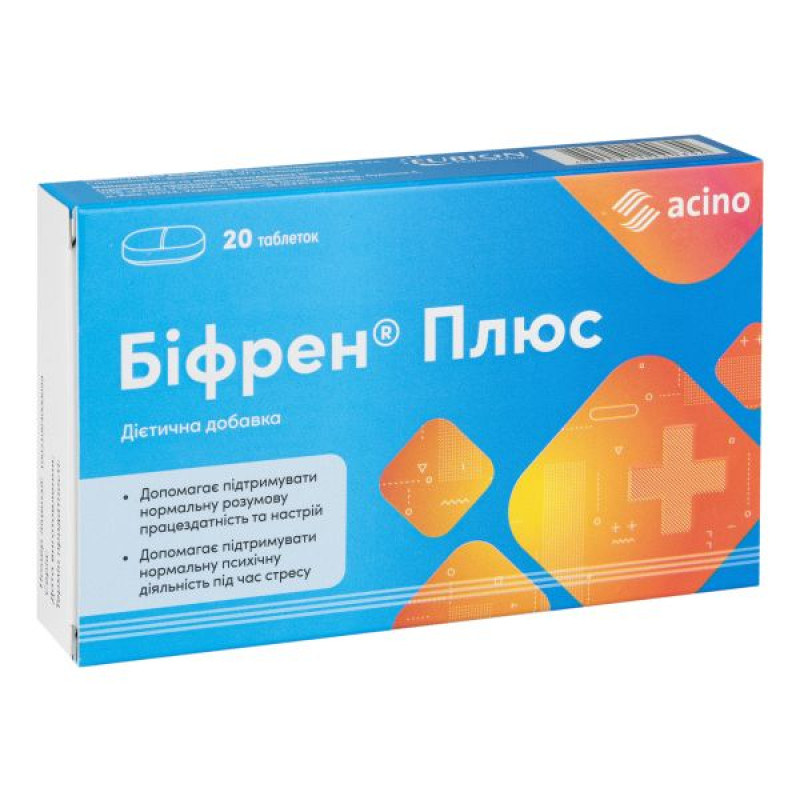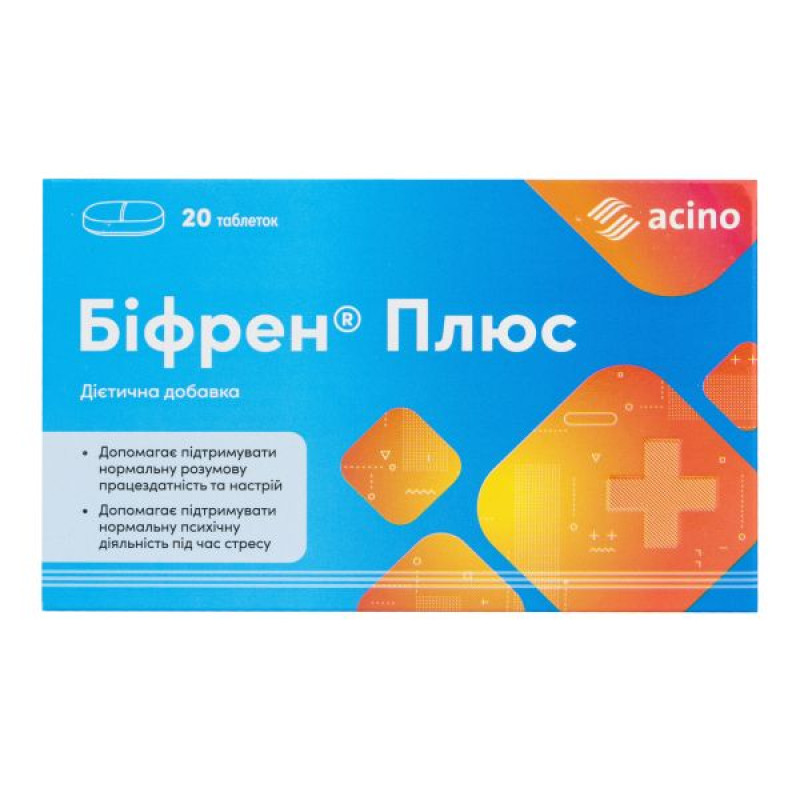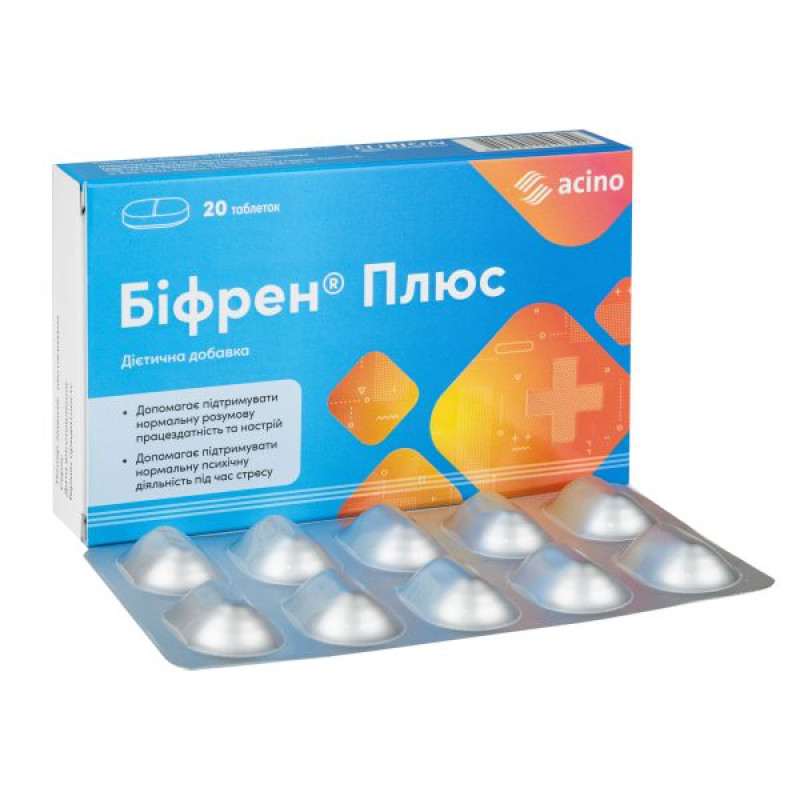Bifren Plus tablets No. 20

Scientifically proven properties of the ingredients*:
According to publicly available literature sources, the components included in Bifren® Plus have the following properties:
GABA
Gamma-aminobutyric acid (GABA) is formed from glutamate by the addition of glutamate decarboxylase and vitamin B6 and is released into the postsynaptic terminals of neurons (1). GABA is an amino acid that serves as the primary inhibitory neurotransmitter in the brain and the primary inhibitory neurotransmitter in the spinal cord. It performs its primary function at the synapse between neurons by binding to postsynaptic GABA receptors, which modulate ion channels, hyperpolarizing the cell, and inhibiting action potential transmission (2). GABAergic neurons are located in the hippocampus, thalamus, basal ganglia, hypothalamus, and brainstem. The balance between inhibitory neuronal transmission via GABA and excitatory neuronal transmission via glutamate is essential for proper cell membrane stability and neurological function. Brain circuits in the amygdala are thought to contain inhibitory networks of γ-aminobutyric acid-ergic (GABAergic) interneurons, and thus this neurotransmitter plays a key role in modulating anxiety responses in both normal and pathological conditions (19; 1).
GABA may have beneficial effects on stress and sleep. GABA primarily affects sleep onset and the early stages of sleep that occur early in the night (i.e., the first stage of non-REM sleep), but not the stages of sleep that occur later in the night (3).
Folic acid
Folic acid (pteroylmonoglutamic acid, also known as vitamin B9) is a water-soluble compound. It is converted to tetrahydrofolic acid. This compound undergoes several transfer/methylation reactions that are important for the synthesis of nitrogenous bases in DNA and ribonucleic acid (RNA) and is required for the maturation of red blood cells (4). Folic acid is one of the 8 B vitamins. All B vitamins help the body convert food (carbohydrates) into fuel (glucose) that is used to produce energy.
The biologically active form is reduced tetrahydrofolate, which is an important cofactor in methylation reactions, including the vitamin B12-dependent formation of methionine from homocysteine, and as a carrier of one-carbon units involved in the synthesis of purines and pyrimidines. Folate deficiency is associated with megaloblastic anemia, embryonic defects, including neural tube defects, mood disorders, irritability, insomnia, fatigue, and cognitive impairment (5; 6). Vitamins B1, B6, B12, B9 (folic acid) and D, choline, iron, and iodine have neuroprotective effects and improve intellectual performance (6). Folate contributes to the physiological function of the brain and plays a role in mental and emotional health.
Vitamin C
Vitamin C (L-ascorbic acid) is also known as ascorbic acid and dehydroascorbic acid (10).
Vitamin C is a water-soluble vitamin, an antioxidant, and an essential cofactor for collagen biosynthesis, carnitine and catecholamine metabolism, and dietary iron absorption. It also stabilizes vitamin E and folate, neutralizes free radicals and toxins, and reduces inflammation (11). Vitamin C promotes the production of serotonin, which has a positive effect on mood.
Vitamin B1
B1 (thiamine) is a water-soluble vitamin. Thiamine combines with adenosine triphosphate (ATP) in the liver, kidneys, and white blood cells to form thiamine diphosphate (also known as thiamine pyrophosphate). This biologically active form is a coenzyme in many metabolic pathways, including carbohydrate metabolism (via decarboxylation of pyruvic and alpha-keto acids) and transketolation in the pentose monophosphate pathway (13). Thiamine is essential for the metabolism of amino acids and carbohydrates, and is also active in energy-generating reactions (12). Vitamin B1 is involved in a number of functions in the body, including maintaining the functioning of the nervous system, maintaining muscle function (electrolyte flow in these cells), participating in carbohydrate metabolism, in enzymatic processes, and in the production of hydrochloric acid, which is necessary for digestion (13). Thiamine has a positive effect on the nervous system, contributing to the restoration of nerve cells.
B6 (pyridoxine) is a water-soluble compound. Vitamin B6 is an essential cofactor in many enzymatic reactions, including the metabolism of amino acids, carbohydrates, and lipids. It contributes to neurotransmitter synthesis, cognitive development, and supports immune function through the production of interleukin-2 and hemoglobin formation (14).
Glycine
Glycine is one of the main neurotransmitters in the central nervous system and plays an important role in regulating nerve activity. It has several properties that may affect nervous system function and performance. Sedative properties: Glycine acts as an inhibitory neurotransmitter, meaning it can slow down or reduce the activity of nerve cells in some parts of the brain. This can lead to calmness and reduced feelings of anxiety (15). Sleep regulation: Glycine is also involved in regulating sleep and wakefulness. Some studies show that glycine may improve sleep quality and reduce the time it takes to fall asleep, as well as reduce daytime wakefulness (16). Cognitive enhancement: Some studies show that glycine may have positive effects on cognitive functions such as concentration, memory, and problem-solving (17). Nervous system protection: Glycine may have protective properties for the nervous system, helping to protect neurons from damage and exerting antioxidant effects ( 18 ).
*Please note that these studies are provided for informational purposes only and do not constitute medical advice. If you are considering using Bifren® Plus or any other dietary supplement, you should consult your doctor.
Reservation
Not recommended for use in case of individual hypersensitivity to the main ingredients; children and adolescents under 18 years of age, pregnant or breastfeeding women. This product is not intended for the diagnosis, treatment or prevention of any disease, and should not be used as a substitute for a complete diet. Do not exceed the recommended daily dose. Do not use after the expiration date indicated on the package.
Before use, a doctor's consultation is required. It is not a medicinal product.
Expiration date
It is best to consume by the end of the date indicated on the package; the shelf life is 36 months from the date of manufacture.
Storage conditions
Store in a dry, dark place out of reach of children at a temperature not exceeding 25°C.
Producer
Manufacturer's name: Eubion Corporation Sp. z.o.o., Sarmacska 11, Warsaw, 02-972, Poland.
Name and location of the importer (acceptance of claims from consumers): LLC "ASINO UKRAINE", Vaclav Havel Boulevard, 8, Kyiv, 03124, Ukraine.
There are no reviews for this product.
There are no reviews for this product, be the first to leave your review.
No questions about this product, be the first and ask your question.


















